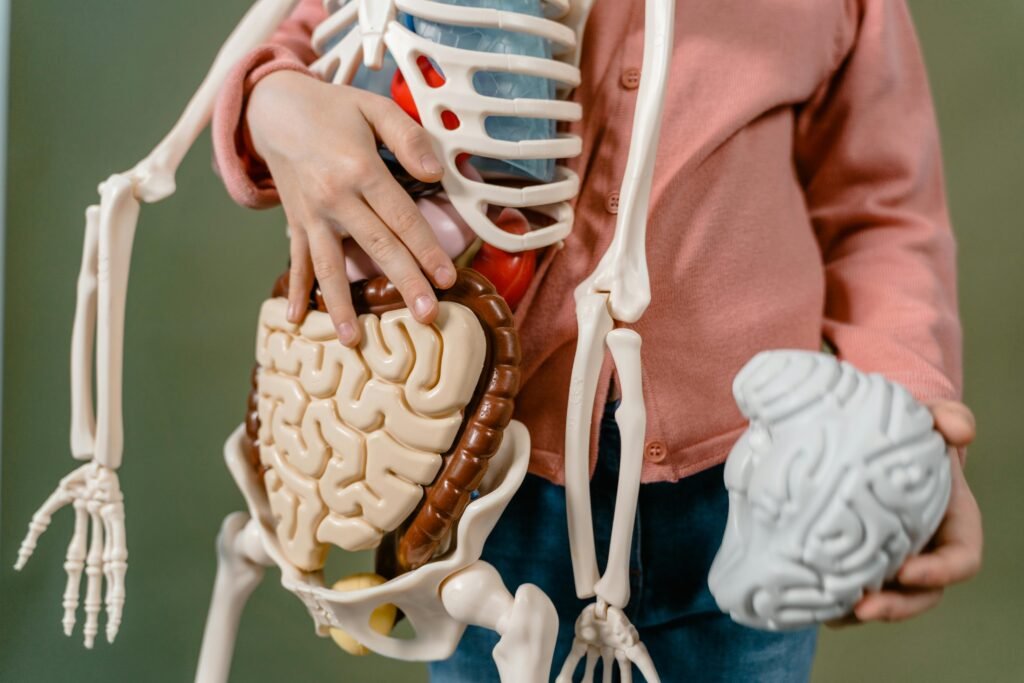
Introduction
Working night shifts can turn your world upside down and unfortunately, your digestive system often bears the brunt of this disruption. If you are experiencing stomach pain, bloating, irregular bowel movements, or that uncomfortable feeling of indigestion that seems to have become your constant companion since starting night work, you are not alone. Night shift digestive problems are so common among shift workers that researchers have identified a specific pattern of gastrointestinal problems linked to disrupted sleep schedules and reversed eating patterns.
Your digestive system operates on its own internal clock, synchronized with your circadian rhythm. When you work nights, you are essentially asking your stomach, intestines, liver, and other digestive organs to function optimally at times when they are programmed to rest and repair. This biological conflict creates a cascade of problems that can affect everything from how well you digest food to how your body absorbs nutrients and maintains healthy gut bacteria.
The good news is that understanding why night shift work affects your digestive health is the first step toward healing and managing these issues. With targeted strategies that work with your body’s natural processes rather than against them, you can significantly improve your digestive comfort and overall gut health, even while maintaining your night shift schedule.
Understanding The Night Shift Digestive Problems

Your digestive system does not operate at the same efficiency around the clock. Like many other body systems, it follows a circadian rhythm that anticipates when you will eat, digest, and eliminate waste. This internal timing system affects the production of digestive enzymes, stomach acid, bile, and hormones that regulate hunger and satiety.
During normal daytime hours, your body produces higher levels of digestive enzymes and stomach acid in preparation for meals. Your liver also follows a circadian pattern, with peak detoxification and metabolism occurring during specific times. The muscles in your intestines, responsible for moving food through your digestive tract, also follow rhythmic patterns that align with traditional eating and sleeping schedules.
When you work night shifts, several disruptions occur simultaneously. Your stomach may produce less acid during the night hours when you are eating, making it harder to break down proteins and absorb nutrients like vitamin B12, iron, and calcium. Your liver’s detoxification processes may be less efficient when processing the foods and beverages you consume during your shift.
The hormone insulin, which helps regulate blood sugar levels, also follows a circadian pattern. Insulin sensitivity is naturally lower during nighttime hours, meaning your body may struggle more to process carbohydrates consumed during your shift. This can lead to blood sugar spikes and crashes that affect your energy levels and contribute to digestive discomfort.
Your gut microbiome, the collection of beneficial bacteria living in your intestines, also operates on a circadian rhythm. These bacteria help with digestion, immune function, and the production of important compounds like short-chain fatty acids. Night shift work can disrupt the balance and timing of these microbial communities, leading to digestive problems and potentially affecting your overall health.
Common Night Shift Digestive Problems

Night shift workers experience a unique set of digestive challenges that stem from eating and sleeping at times when their bodies expect the opposite. Acid reflux and heartburn are among the most common complaints often occurring because stomach acid production does not align with meal times. When you eat during hours when acid production is naturally lower, food may not be properly broken down leading to fermentation and gas production that can cause bloating and discomfort.
Constipation is another frequent issue, as the natural rhythms of intestinal muscle contractions become disrupted. Your colon typically has increased activity in the morning hours, which is why many people have bowel movements shortly after waking. When your sleep schedule is reversed, this natural elimination pattern can become irregular, leading to constipation and the uncomfortable feeling of incomplete bowel movements.
Many night shift workers also experience what feels like chronic indigestion or stomach upset. This can manifest as a feeling of fullness even after eating small amounts, nausea, stomach pain, or general digestive discomfort that seems to persist regardless of what you eat. These symptoms often result from the mismatch between when you are eating and when your digestive system is prepared to handle food efficiently.
Irregular bowel movements, alternating between constipation and loose stools, are also common. This inconsistency can be particularly frustrating and may be related to stress, irregular eating patterns, changes in gut bacteria, and the disruption of normal digestive rhythms.
Some night shift workers develop what appears to be food intolerances or sensitivities that they never had before starting shift work. Foods that were previously well-tolerated may now cause bloating, gas, or digestive upset. This often relates to decreased digestive enzyme production and changes in gut bacteria rather than true food allergies or intolerances.
Timing Your Meals for Optimal Digestion

The timing of your meals can significantly impact how well your digestive system handles food during night shifts. Your largest meal should ideally be consumed before your shift begins, when your digestive system is still operating at higher efficiency. This pre-shift meal should contain a good balance of protein, complex carbohydrates, and healthy fats to provide sustained energy throughout your work period.
During your shift, focus on smaller, more frequent meals rather than one or two large meals. Large meals consumed during nighttime hours can overwhelm your digestive system when it is not prepared to handle substantial amounts of food. Smaller portions are easier to digest and less likely to cause discomfort, bloating, or energy crashes.
Try to eat your last substantial meal at least three hours before the end of your shift. This gives your body time to begin the digestive process before you head home and prepare for sleep. Eating large amounts of food close to your sleep time can interfere with both digestion and sleep quality, as your body struggles to rest while still processing food.
When you arrive home from your shift, resist the urge to eat a large meal before bed, even if you feel hungry. Instead, opt for a light snack if needed, and save your next full meal for when you wake up. This pattern helps maintain some alignment between your eating schedule and your digestive system’s natural rhythms.
Consider the concept of time-restricted eating, where you consume all your food within a specific window of hours. Some night shift workers find that limiting their eating to a twelve-hour window helps their digestive system maintain better rhythm and reduces symptoms like bloating and indigestion.
Food Choices That Combat Night Shift Digestive Problems

The foods you choose during your night shifts can either support or hinder your digestive health. Easily digestible foods should form the foundation of your night shift nutrition plan. These include lean proteins like chicken, fish, eggs, and plant-based options like tofu or legumes. These proteins are less likely to cause digestive stress than fatty or heavily processed meats.
Complex carbohydrates like quinoa, brown rice, sweet potatoes, and oats provide sustained energy and are generally easier on the digestive system than simple sugars or refined grains. These foods also contain fiber, which supports healthy gut bacteria and regular bowel movements, but choose sources that you know you tolerate well.
Incorporate foods that naturally support digestion throughout your shift. Ginger has anti-inflammatory properties and can help reduce nausea and digestive discomfort. You can add fresh ginger to tea, smoothies, or meals. Peppermint tea can help soothe digestive upset and reduce bloating, making it an excellent choice for a mid-shift beverage.
Probiotic-rich foods can help support your gut microbiome, which becomes disrupted during shift work. Yogurt with live cultures, kefir, sauerkraut, kimchi, and other fermented foods can help maintain beneficial bacteria in your digestive tract. However, introduce these foods gradually, as some people may experience increased gas or bloating initially.
Avoid foods that are known to cause digestive problems, especially during your shift. Spicy foods, high-fat meals, excessive caffeine, and foods high in refined sugar can all contribute to digestive discomfort. Carbonated beverages can increase bloating and gas, particularly when your digestive system is already compromised.
Be mindful of your fiber intake and choose sources carefully. While fiber is important for digestive health, too much fiber, especially from sources you are not used to, can cause bloating and gas. Gradually increase fiber intake and focus on soluble fiber sources like oats, apples, and beans, which are generally better tolerated than insoluble fiber.
Hydration Strategies for Digestive Health

Proper hydration plays a crucial role in maintaining healthy digestion, and night shift workers often struggle with maintaining adequate fluid intake due to irregular schedules and increased caffeine consumption. Dehydration can slow digestion, contribute to constipation, and make existing digestive problems worse.
Start your shift well-hydrated by drinking water throughout the day before work. During your shift, aim to drink water consistently rather than consuming large amounts infrequently. Sipping water throughout your shift helps maintain steady hydration levels and supports optimal digestion.
The temperature of your beverages can also affect digestion. Room temperature or warm beverages are generally easier on the digestive system than very cold drinks, which can slow gastric emptying and potentially cause cramping in sensitive individuals. Herbal teas like chamomile, fennel, or ginger tea can provide hydration while also offering digestive benefits.
Be strategic about your caffeine intake, as excessive caffeine can contribute to digestive problems. Caffeine can increase stomach acid production, potentially worsening acid reflux or heartburn. It can also have a laxative effect, which may contribute to digestive irregularity. Limit caffeine to the first half of your shift when possible, and always pair caffeinated beverages with water to prevent dehydration.
Consider adding a pinch of sea salt to your water occasionally, especially if you are experiencing digestive issues. Proper electrolyte balance supports muscle function throughout your digestive tract and can help with both constipation and digestive cramping.
Avoid excessive alcohol consumption, which can irritate the digestive tract and disrupt sleep patterns. While you might be tempted to use alcohol to help you relax after a shift, it can worsen digestive problems and interfere with the restorative sleep your body needs to repair and maintain digestive health.
Managing Stress and Its Impact on Night Shift Digestive Problems

The connection between stress and digestive health is particularly relevant for night shift workers, who face unique stressors that can significantly impact gut function. Chronic stress affects digestion through multiple pathways, including changes in stomach acid production, alterations in gut bacteria, and disruption of the gut-brain axis that coordinates digestive processes.
When you are stressed, your body produces higher levels of cortisol and other stress hormones that can slow digestion, reduce blood flow to the digestive organs, and alter the balance of bacteria in your gut. Night shift work inherently creates stress on your body by disrupting natural rhythms, and this stress can manifest as digestive problems even when you are not consciously feeling anxious or overwhelmed.
Develop stress management techniques that you can use both during and after your shifts. Deep breathing exercises can be particularly helpful for digestive health, as they activate the parasympathetic nervous system, which is responsible for rest and digest functions. Taking a few minutes to practice deep breathing before meals can help prepare your digestive system to function more effectively.
Progressive muscle relaxation can help reduce physical tension that may be affecting your digestive organs. Many people hold stress in their abdominal muscles without realizing it, which can interfere with normal digestive processes. Regular relaxation practice can help release this tension and improve digestive comfort.
Consider incorporating gentle movement or stretching into your routine, both during work breaks and at home. Physical activity stimulates digestive motility and can help prevent constipation. Even simple movements like walking or gentle stretching can promote healthy digestion and reduce stress levels.
Address work-related stressors when possible by communicating with supervisors about workload concerns, improving workplace ergonomics, or seeking support for interpersonal conflicts. Chronic work stress can have lasting effects on digestive health, so addressing these issues proactively is important for your long-term well-being.
Supporting Your Gut Microbiome During Shift Work

Your gut microbiome, the community of bacteria and other microorganisms living in your digestive tract, plays a crucial role in digestion, immune function, and overall health. Night shift work can significantly disrupt this microbial community, leading to digestive problems and potentially affecting your susceptibility to illness and your mood.
The timing of your meals affects your gut bacteria, as different bacterial species are active at different times of day. When you eat during hours when your beneficial bacteria are less active, harmful bacteria may have an opportunity to proliferate, leading to digestive imbalances and symptoms like bloating, gas, and irregular bowel movements.
Support your gut microbiome by including prebiotic foods in your diet. Prebiotics are types of fiber that feed beneficial bacteria in your gut. Good sources include garlic, onions, leeks, asparagus, bananas, and oats. These foods help maintain healthy bacterial populations even when your eating schedule is disrupted.
Probiotic supplements may be beneficial for night shift workers, as they can help maintain beneficial bacteria levels during times of circadian disruption. Look for supplements containing multiple strains of bacteria, including Lactobacillus and Bifidobacterium species. Take probiotics consistently and follow the manufacturer’s instructions for storage and timing.
Limit antibiotic use to when it is medically necessary, and if you must take antibiotics, discuss with your healthcare provider about strategies to minimize disruption to your gut microbiome. This might include taking probiotics during and after antibiotic treatment to help restore beneficial bacteria.
Avoid excessive use of antibacterial products, including hand sanitizers and antibacterial soaps, when regular soap and water are sufficient. While maintaining good hygiene is important, excessive exposure to antibacterial agents can disrupt the beneficial bacteria on your skin and potentially affect your gut microbiome.
Sleep Quality and Digestive Health Connection

The relationship between sleep and digestive health is bidirectional, meaning that poor sleep can cause digestive problems, and digestive issues can interfere with sleep quality. For night shift workers, this connection becomes even more complex, as both sleep and digestion are disrupted by the reversed schedule.
During sleep, your digestive system undergoes important repair and maintenance processes. The cells lining your intestines regenerate, beneficial bacteria multiply, and your liver processes toxins and metabolizes nutrients. When your sleep is disrupted or insufficient, these processes cannot occur properly, leading to digestive problems and poor nutrient absorption.
Create a sleep environment that supports both rest and digestive health. Keep your bedroom cool and dark, as temperature and light exposure affect both sleep quality and digestive hormone production. Avoid eating large meals within three hours of sleep, as this can interfere with both digestion and sleep onset.
If digestive discomfort is keeping you awake, address these issues proactively. Elevate the head of your bed slightly if you experience acid reflux, use a heating pad on your abdomen if you have digestive cramping, or try gentle stretching or yoga poses that promote digestion before bed.
Consider the timing of supplements and medications that might affect sleep or digestion. Some supplements are better absorbed when taken with food, while others should be taken on an empty stomach. Work with your healthcare provider to optimize the timing of any medications or supplements you take regularly.
When to Seek Professional Help for Digestive Issues

While many digestive problems related to night shift work can be managed with dietary and lifestyle changes, there are times when professional medical evaluation becomes necessary. Persistent or severe symptoms should not be ignored, as they may indicate underlying conditions that require treatment.
Seek medical attention if you experience severe abdominal pain, blood in your stool, persistent vomiting, significant changes in bowel habits that last more than a few weeks, or unintended weight loss. These symptoms may indicate conditions that require immediate medical attention and are not simply related to shift work.
Chronic digestive symptoms that significantly impact your quality of life or work performance should be evaluated by a healthcare provider. This includes persistent acid reflux that does not respond to dietary changes, chronic constipation or diarrhea, or digestive symptoms that interfere with your ability to eat or maintain proper nutrition.
A gastroenterologist who understands the challenges of shift work can provide specialized evaluation and treatment options. They may recommend specific tests to rule out conditions like inflammatory bowel disease, celiac disease, or other digestive disorders that may be exacerbated by shift work.
Consider working with a registered dietitian who has experience with shift workers. They can help you develop a personalized nutrition plan that takes into account your work schedule, digestive symptoms, and individual nutritional needs. This professional guidance can be particularly valuable if you have multiple dietary restrictions or complex digestive issues.
Creating Your Personalized Digestive Health Plan

Successfully managing digestive problems while working night shifts requires a personalized approach that considers your specific symptoms, work schedule, and lifestyle factors. Start by keeping a food and symptom diary for at least two weeks, tracking what you eat, when you eat, your symptoms, and their severity.
Use this information to identify patterns and triggers for your digestive problems. You may discover that certain foods consistently cause problems, or that eating at specific times during your shift leads to discomfort. This information will help you make targeted changes to your diet and eating schedule.
Implement changes gradually rather than trying to overhaul your entire diet and routine at once. Choose one or two strategies to focus on initially, such as adjusting meal timing or eliminating a specific trigger food. Give these changes time to work before adding additional interventions.
Be patient with the process, as it can take several weeks for your digestive system to adapt to new eating patterns and for gut bacteria to rebalance. Consistency is more important than perfection, and small improvements in digestive comfort can compound over time to create significant changes in your overall well-being.
Remember that managing digestive health during shift work is an ongoing process that may require adjustments as your work schedule, age, or health status changes. Stay flexible and be willing to modify your approach as needed to maintain optimal digestive health throughout your shift work career.
